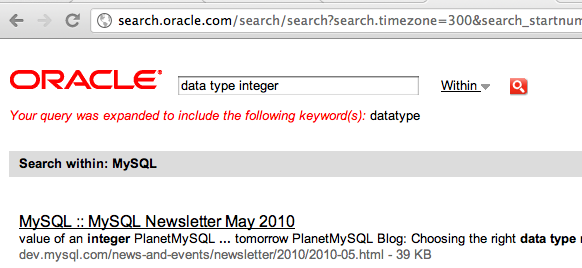I’m not comparing apples to apples yet… but out of the box, drizzle does inserts faster than MySQL using the same table type, InnoDB.
Here’s what I’m comparing:
drizzle r1126 configured with defaults, and
MySQL 5.1.38 configured with
./configure --prefix=/usr/local/mysql --with-extra-charsets=complex \
--enable-thread-safe-client --enable-local-infile --enable-shared \
--with-plugins=partition,innobase
which is really nothing complicated.
SQL query caching is turned off on both database servers. Both are using the InnoDB engine plug-in.
I’m running these benchmarks on a MacBook Pro 2.4 GHz Intel Core 2 Duo with 2GB 1067 MHz DDR3 RAM.
I wrote benchmarking software about 2 years ago to test partitions but I’ve since abstracted the code to be database agnostic.
You can get the benchmarking code at Github.
At the command-line, you type:
php build_tables.php 10000 4 drizzle
where 10000 is the number of rows allocated total, and 4 is the number of partitions for those rows.
You can type the same thing for mysql:
php build_tables.php 10000 4 mysql
and get interesting results.
Here’s what I got:
MySQL
bash-3.2$ php build_tables.php 10000 4 mysql
Elapsed time between Start and Test_Code_Partition: 13.856538
last table for php partition: users_03
Elapsed time between No_Partition and Code_Partition: 14.740206
-------------------------------------------------------------
marker time index ex time perct
-------------------------------------------------------------
Start 1252376759.26094100 - 0.00%
-------------------------------------------------------------
No_Partition 1252376773.11747900 13.856538 48.45%
-------------------------------------------------------------
Code_Partition 1252376787.85768500 14.740206 51.54%
-------------------------------------------------------------
Stop 1252376787.85815000 0.000465 0.00%
-------------------------------------------------------------
total - 28.597209 100.00%
-------------------------------------------------------------
20000 rows inserted...
drizzle
bash-3.2$ php build_tables.php 10000 4 drizzle
Elapsed time between Start and Test_Code_Partition: 7.502141
last table for php partition: users_03
Elapsed time between No_Partition and Code_Partition: 7.072367
-------------------------------------------------------------
marker time index ex time perct
-------------------------------------------------------------
Start 1252376733.68141500 - 0.00%
-------------------------------------------------------------
No_Partition 1252376741.18355600 7.502141 51.47%
-------------------------------------------------------------
Code_Partition 1252376748.25592300 7.072367 48.52%
-------------------------------------------------------------
Stop 1252376748.25627400 0.000351 0.00%
-------------------------------------------------------------
total - 14.574859 100.00%
-------------------------------------------------------------
20000 rows inserted...
MySQL: 699 inserts per second
drizzle: 1372 inserts per second
As far as inserts go, drizzle is about 2 times faster out of the box than MySQL.
